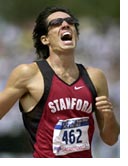 Growing up, Gabe Jennings ran to and from school, four miles each day. His lifestyle and upbringing--the kind that hasn't been typical in this country since the days of the frontier--has had a major impact not only upon his faith but on the philosophy that he'll follow at the Summer Olympics in Sydney.
Growing up, Gabe Jennings ran to and from school, four miles each day. His lifestyle and upbringing--the kind that hasn't been typical in this country since the days of the frontier--has had a major impact not only upon his faith but on the philosophy that he'll follow at the Summer Olympics in Sydney."I was taught to find the magical in the day-to-day," he says. "My parents read to us from the Bible, from Buddhist texts, from "The Iliad" and "The Odyssey," from myths. And what that did was make me aware of this glorious world around us. I'm constantly inspired by what I see around me."
Jennings' boyhood chores included collecting firewood and clearing out the spring to get water. He also began to run to school at the age of 5, with his father following on a bike.
"I don't know if that makes me stronger," Gabe says. "But it does parallel the Kenyan runners and their lifestyle." For years the Kenyans have dominated the distance events at the Olympics in large part because they have grown up running from place to place.
Jennings' father, Jim, followed on the bike to comment on his son's running form but also because he and his wife, Suzanne, were the school's teachers. In those early years, the Jennings family lived in the wilderness hard by the Klamath National Forest in Northern California. A summer night's entertainment was to watch a meteor shower. It wasn't until Gabriel Harmony Jennings was 13 that the family moved to what many would regard as civilization--Madison, Wis.--so Jim Jennings could pursue a graduate degree at the university there.
Gabe's background, his parents' spiritual bent (Jim calls himself a Platonist, Suzanne was raised a Jew), and his outspoken ways make the 21-year-old one of the more intriguing athletes to follow at this year's Summer Games. He was born on January 25, which is also the day legendary U.S. distance runner Steve Prefontaine was born. A self-proclaimed maverick that tried to lead most races from start to finish, Prefontaine died in a car crash in 1975 at the height of career and popularity. Because of Jennings' prowess on the track and his brashness off it, many believe that he could become this country's next Prefontaine.
Like Pre, Jennings is an outspoken perfectionist, who very much sees the world as one full of possibilities. Arriving at Stanford in 1997, he soon competed for national honors in every race from the 800 meters up to the 10,000 meters. Nobody had done that in the college ranks since Prefontaine.
Jennings' spiritual philosophy is a combination of a New Age upbringing and a passionate view of fairness. Besides Prefontaine, his heroes include Che Guevara. He vows never to own a TV because the commercialism "just grosses me out." Around Stanford's Palo Alto campus, he is often seen wearing a white flowing robe he purchased in Morocco--a fashion statement Sports Illustrated called "more J. Christ than J. Crew."
Another rhythm to Jennings' life is a love of music that began back when his family was living in the cabin in Northern California. It involves the power of chanting and drums. By the age of 5, Jennings was not only running to and from school but excelling at playing the drums as well. He was in his first rock band by 10, an occasion that he still considers a watershed event.
"I love music," he says. "It helps unleash that wild animal in myself."
During a race, competitors often hear Jennings talking to himself. But the runner explains that he is "only rapping"--trying to find the rhythm that will allow him to succeed.
When Jennings competes he brings along his bongos or percussion sticks, playing and chanting during races other than his own. He organizes impromptu jam sessions in the stands--something Stanford coach Vin Lananna wasn't crazy about until he noticed that Jennings didn't stop drumming until every runner had finished.
Heading to Sydney, Jennings says he wants to be open to "the entire experience." And while he isn't expected to medal this time around, what he brings away from the Olympics will help him four years from now.
"That's where my spirituality--how I've been taught to approach life--can help me," Gabe says. "I have to be open to everything, good and bad, and find a way to let that flow into my running."

